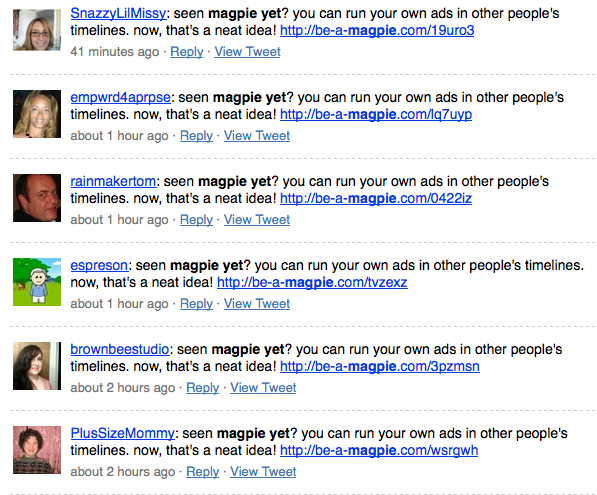
After a summer break,
MoMo London returned this week with a great event discussing the future of mobile platforms. Held at the usual venue, CBI Conference Center in Centre Point Tower, the evening was sponsored by Yahoo! and facilitated by EMCC Software.
Blog posts on the evening have already appeared from
Simon Judge and
Kai Hendry. Below are the notes I took on the evening, which I'm sure are far from comprehensive and may not make sense unless you were there, but I hope they prove useful in some shape or form:
Chair:
Panel Members:
Platform fragmentation
- OMTP looking for consensus on key issues.
What do we mean by platforms?
- A cheap way to build an application
- OR What developers develops their applications for
Different platforms at both ends of the scale
- All pervasive, e.g. Text
- Other end of line – Symbian application, deeper user experience but not much penetration
In between user experience and market penetration is ideal, but doesn't give you a good return/monetisation
Web is fantastic for broad applications. For mobile applications, need access to things that classically present a security problem, e.g. access to contacts and location.
It's difficult to write apps for a sustainable business model. Only success story (apart from porn) is mobile ringtones.
How can we get consistency in what the web can gave to native mobile platforms so that it doesn't threaten security and viability of mobile applications/platforms?
Trying to find application environment that is ubiquitous, is quick to develop with, and quick to deploy to the end user.
It is the integration with the web that really adds to the richness of the user experience.
Computer games developers optimise for certain platforms, e.g. Brain Training for the Nintendo DS.
- Fragmentation of mobile platforms doesn't make this possible for mobile developers, unless you target a niche with a large audience, such as Blackberry users.
- Also made more complex by different languages and societies with different grades of mobile handsets around the world.
1 billion mobile phones sold around the world per year. 40% of those are Nokia handsets.
App stores could be tailored to who the consumer is, e.g. only present them with apps relevant to their handset.
Develop apps for Nokia Series 60 and Blackberry and you can capture the majority of the mobile app audience.
Apps that already exist on the web aren't interesting to mobile users. Those that are enhanced and unique to th mobile are a lot more interesting.
iPhone app store works because it is such a seamless experience. It is easy to connect to the internet, easy to connect to the app store, and easy to pay for items as it is billed to your iPhone account. If operators see this model working, they will replicate it and incorporate it into their own business model.
Writing apps for the web gives you 10s of millions of users, but for the mobile space only gives you a few million at most. The business model doesn't scale well.
Consumers who don't download apps are not averse to spending money, but disappointed with apps and games that they have downloaded. Web still gives a much richer user experience.
Lots of phones will not get more powerful, but they will get a lot cheaper. Phones will become to be priced 12-15 pounds. But for the next 2 billion people to enter the market by buying these phones this is still very expensive, e.g. a weeks wages.
Two ways of stopping fragmentation:
- 1 or 2 companies monopolise the market
- Operators and developers collaborate on a single platform
One of the biggest applications in India is having a torch on your phone – extremely useful to a large base of users, but no sustainable business model given their economic demographic
OMTP trying to construct a system which properly constructs trust in the system and completely removes the unneeded questions that users have to deal with. E.g. taking an application from one operator/mobile platform to another without having to re register of fill out more security certificates
Ben Whitaker: Users shouldn't ever have to deal with different languages for different phones or have to set up their own internet connections. The technology for a standardised WAP system is available but very few operators install it automatically.
Yahoo! Blueprint
- How are they going to make money out of this?
- The way they make money is to make their own applications. Yahoo's motivation behind releasing Yahoo Blueprint is to gain the audience and then monetise once the audience is there.
- Yahoo wants to get the reach so they only have one system for each different type of platform, e.g. Symbian, Java, etc
LastMinute.com aren't looking to see applications, but rather get people to buy stuff from LastMinute.com through using free applications on their phone.
- Using as a trial to see what the user uptake is in this space, e.g. what do users find useful?
- But only concentrated on Western European users and find mobile secondary to what users have on web at home or work.
Trying to resolve the fragmentation issue by bringing out your own solution will just result in ore fighting over the issue. The reason Firefox become so successful was that it started to do the same things as IE but make it better and with added features.
If a user doesn't have an internet connection on the phone, the app automatically detects this and completes the registration process through encrypted SMS texts.
Ladbrokes reported 250% uplift in users when they introduced full registration on mobile rather than on the web.
As with the web, we will see some standardisation at some point, but this has to come from something higher than a company or organisation. When this will happen is determined when it comes to the point when users say that this isn’t working
Customers didn't buy the Wii for the Wii, but they bought the Wii when they saw someone else playing Wii sports and bought the Wii so that they too could play Wii sports. It's a dot com phrase, but that 'killer app' which is easy to use, offers a rich experience and is easily shareable among users will make a lot of money even if it is on one platform.
"The successes of Facebook and YouTube, along with similar sites, meant that social networks accounted for 1 in every 10 UK Internet visits during Christmas week. For the week ending 27/12/08, our Computers and Internet – Social Networking and Forums category accounted for 10.09% of all UK Internet visits, the first ever time it has passed the 10% threshold."
Robin Goad, Research Director at Hitwise UK


























